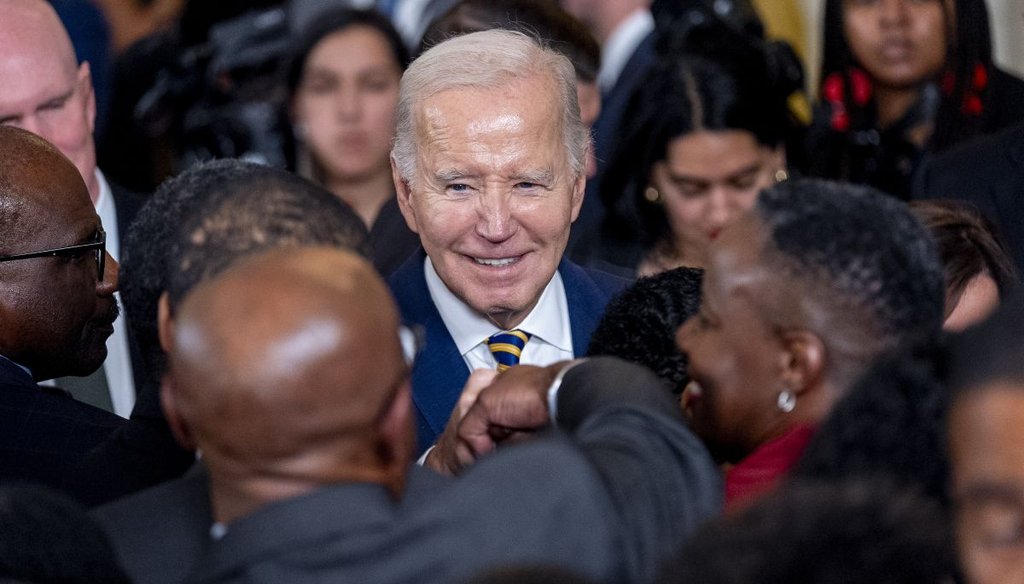Get PolitiFact in your inbox.

President Joe Biden greets audience members during a Black History Month reception at the White House on Feb. 6, 2024. (AP)
Is inflation down to 2%, as Joe Biden said? It depends on your metric
If Your Time is short
-
Using two main inflation metrics, the U.S. inflation rate has ranged from 2.6% to 3% over the past six months.
-
The White House said it’s referring to a different calculation that measures inflation over the past six months, then projects that out to a full year. That measure is at 2%.
-
Economists told PolitiFact that the White House’s metric is credible although obscure and perhaps misleading to noneconomists.
-
Our mission: Help you be an informed participant in democracy. Learn more.
As inflation has cooled since its peak in summer 2022, President Joe Biden has been increasingly eager to tout the trend of moderating prices.
In a Feb. 4 post on the social media platform X, Biden wrote, "Experts said that to get inflation under control, we needed to drive up unemployment. We found a better way. Under my plan, unemployment has been under 4% for two full years now, and inflation has been at the pre-pandemic level of 2% over the last half year."
What Biden said about unemployment is accurate. But what about inflation being "at the pre-pandemic level of 2% over the last half year"?
It depends on which measure you use.
How inflation is measured
The most common inflation statistics broadcast to Americans in economic news coverage come from the consumer price index. These statistics, calculated by the federal Bureau of Labor Statistics since 1947, use surveys to measure how prices for a variety of consumer items in a set basket of goods rise or fall from month to month.
However, the consumer price index, also known as CPI, is not the only way to measure inflation.
The other major measure is personal consumption expenditures, or PCE. It is calculated by a different federal agency, the Commerce Department, and derives from data from federal agencies and private-sector business groups.
Most economists pay closer attention to PCE because it’s based on past purchases consumers make rather than prices consumers are offered. The different methodologies mean that PCE captures choices consumers make to substitute one type of less expensive good for another; CPI does not.
Importantly, the Federal Reserve — the independent entity focused on fighting inflation — puts more emphasis on PCE data when deciding whether to raise or lower interest rates, economists say.
What the numbers show
Using the consumer price index, Biden’s statement in the X post is incorrect.
For the past six months, year-over-year inflation as measured by the CPI has hovered near 3%, not 2%. Because the Federal Reserve has said it’s aiming for steady 2% inflation before it lowers interest rates, being at 3% means the Fed wouldn’t be ready to loosen the reins yet.
So, is Biden right using PCE? Not using year-over-year data. For both November and December 2023, the PCE method pegged year-over-year inflation at 2.6%. And for the four months before that, the rate ranged from 2.9% to 3.3%.
What the White House says
When asked about metrics, the White House said it was using PCE — but not the year-over-year figure.
Instead, it’s using the "six-month annualized rate." This measures price increases over the last six months, then doubles that figure to see how much prices would have risen at the same rate over a full year.
Using this method, annualized inflation has been 2% over the past six months.
Economists told PolitiFact that this is a credible metric.
"If you want an indicator of the underlying trend in consumer price change, with less month-to-month variability," the metric the White House is using "probably does a better job," said Gary Burtless, an economist with the Brookings Institution, a Washington, D.C.-based think tank.
Economists said although the White House is on solid ground with the numbers, it courts confusion.
Most media coverage focuses on CPI, so that’s how ordinary Americans are used to framing the issue, said Douglas Holtz-Eakin, president of the American Action Forum, a center-right think tank.
In the public, "no one thinks about PCE," Holtz-Eakin said. "If you’re the White House and want to make this your core message, you should note that you’re referring to PCE and explain what that is. If you haven’t done that, it feels like cherry-picking."
Our ruling
Biden said, "Inflation has been at the pre-pandemic level of 2% over the last half year."
Because the Fed has said it’s aiming for steady 2% inflation before it lowers interest rates, being at 3% means the Fed wouldn’t be ready to loosen the reins yet.
Using most basic form of the two main metrics, inflation has ranged from 2.6% to 3% over the past six months.
The White House said it’s referring to a version of one of the metrics that gauges inflation over the past six months and then projects that out to a full year. That figure is currently 2%.
Economists said this metric is credible, but added that its obscurity risks misleading ordinary Americans who are familiar with more commonly cited measurements.
We rate the statement Half True.
Our Sources
Joe Biden, post on X, Feb. 4, 2024
White House Council of Economic Advisers, post on X, Jan. 26, 2024
Federal Reserve Bank of St. Louis, consumer price index, accessed Feb. 6, 2024
Bureau of Economic Analysis, news release archive, accessed Feb. 6, 2024
Email interview with Gary Burtless, senior fellow with the Brookings Institution, Feb. 6, 2024
Interview with Douglas Holtz-Eakin, president of the American Action Forum, Feb. 6, 2024
Browse the Truth-O-Meter
More by Louis Jacobson
Is inflation down to 2%, as Joe Biden said? It depends on your metric
Support independent fact-checking.
Become a member!
In a world of wild talk and fake news, help us stand up for the facts.
































